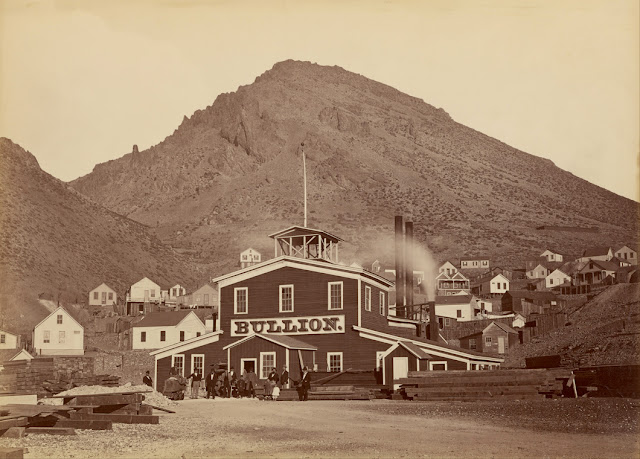by Glenn Franco Simmons
My last post included author C.C. Goodwin’s prosaic and philosophical insights on the untimely death of Mr. Wright has had a sobering effect on the gentlemanly Comstock Club in Virginia City, Nev.
After Mr. Wright's wake, the professor spoke about the very real sacrifices of those who mined the silver that made many people rich — the value of which was eventually represented in U.S. coinage.
He lamented about the anonymous miners' sacrifice of health, and of the devastating price that miners' loved ones paid when a miner was injured or killed.
He felt the true value of the silver mined was in no way reflected in the wholesale and retail silver markets; essentially saying that miners were an inconvenient necessity for mine owners.
"Three days ago this piece of crumbling dust {Mr. Wright} was a brave soldier of peace,” the professor said. “I mean the words in their fullest sense. Just now our brothers in the East are fearful lest so much silver will be produced that it will become, because of its plentifulness, unfit to be a measure of values.
“They do not realize what it costs or they would change their minds.
 |
| 1879S Morgan Rev. |
“They revile the stamp which the Government has placed upon the white dollar.
“Could they see deeper they would perceive other stamps still. There would be blood blotches and seams made by the trickling of the tears of widows and orphans, for before the dollar issues bright from the mint, it has to be sought for through perils which make unconscious heroes of those who prosecute the search.
“For nearly twenty years now, on this lode, tragedies like this have been going on. We hear it said: 'A man was killed to-day in the Ophir,' or 'a man was dashed to pieces last night in the Justice,' and we listen to it as merely the rehearsal of not unexpected news.
"Could a list of the men who have been killed in this lode be published, it would be an appalling showing. It would outnumber the slain of some great battle.
"Besides the deaths by violence, hundreds more, worn out by the heat and by the sudden changes of temperature between the deep mines and the outer air, have drooped and died.
 |
| Obverse of an 1857 Seated Liberty Half Dime. |
"The effect is apparent upon our miners. Their bearing perplexes strangers who come here. They do not know that in the conquests of labor there are fields to be fought over which turn volunteers into veteran soldiers quite as rapidly as real battle fields.
"They know nothing about storming the depths; of breaking down the defences of the deep hills.
"They can not comprehend that the quiet men whom they meet here on the streets are in the habit of shaking hands with Death daily until they have learned to follow without emotion the path of duty, let it lead where it may, and to accept whatever may come as a matter of course.
"Such an one was this our friend, who fell at his post; fell in the strength of his manhood, and when his great heart was throbbing only in kindness to all the world.
"One moment he exulted in his splendid life, the next he was mangled and crushed beyond recovery.
"Still there was no repining, no spoken regrets. For years the possibility of such a fate as this had been before his eyes steadily; it brought much anguish to him, but no surprise.
 |
| Obverse of an 1857 Seated Liberty. |
"He had lived a blameless life. As it drew near its close the vision of his mother was mercifully sent to him, and so in his second birth the same arms received him that cradled him when before he was as helpless as he is now.
"By the peace that is upon him, I believe those arms are around his soul to-night; I believe he would not be back among us if he could.
"We have a right on our own account to grieve that he is gone, but not on his. He filled on earth the full measure of an honest, honorable, brave and true life. That record went before him to Summer Land. I believe it is enough and that he needs neither tears nor regrets."
A few days more went by, but the old joy of the Club was no more.
(This is my last post with regard to “The Comstock Club,” authored by C.C. Goodwin — one of the most prosaic and philosophical writers who belonged to The Sagebrush School of Writers that were dominant mostly in Nevada. The rest of the book contains many a surprise — surprises I will not mention here because, to do so, would ruin it for those who read the book.)





















